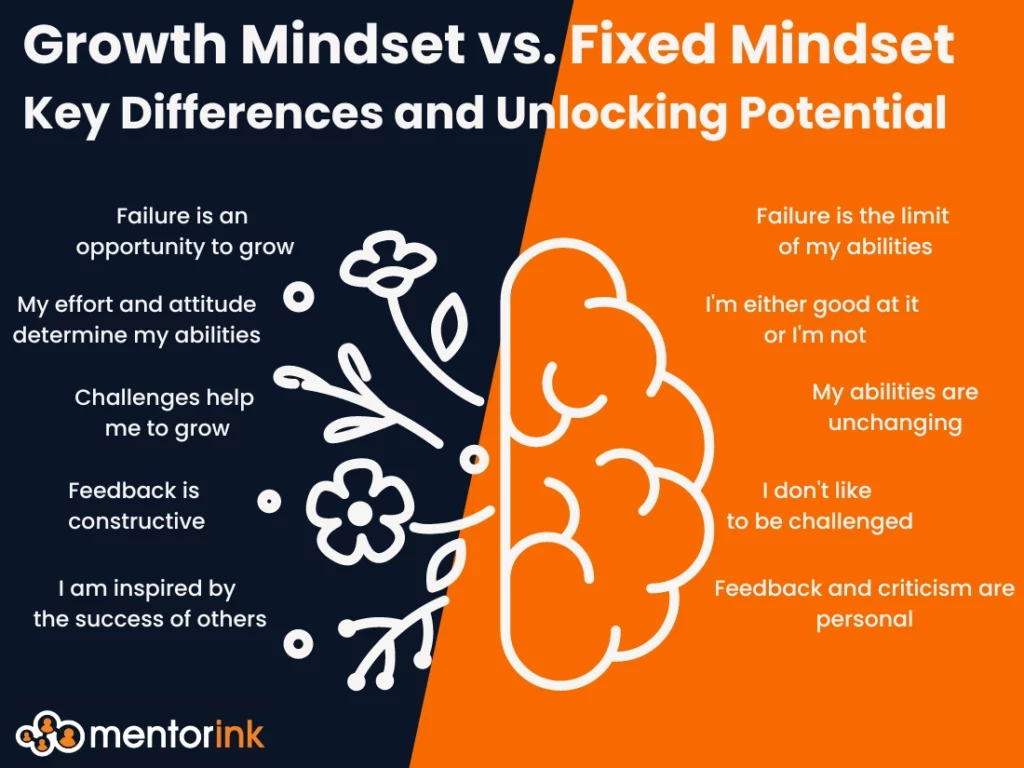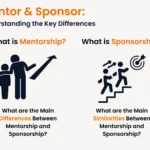
Trying to improve ourselves, to reach our potential, to get out of our comfort zone is one of the challenges we all face. Everyone has different perspectives and different experiences along the way. It is very important to understand the concepts of growth mindset and fixed mindset, learning the differences between them and adapting them to our lives for personal and professional growth. In this blog, we will explore the definitions of both mindsets, emphasize the differences between a growth vs. fixed mindset, and discuss the importance of developing a growth mindset for success.
What is a Growth Mindset?
Growth mindset was introduced by Stanford University psychologist Carol S. Dweck and her colleagues after years of work. Carol S. Dweck believes that success in our lives is related to how we recognize our skills and abilities. (Source) Let’s first look at the definition of growth mindset.
Definition of a Growth Mindset
A growth mindset is the belief that talents and intelligence can be developed through dedication, hard work and perseverance. People with a growth mindset embrace challenges, learn from criticism and believe that hard work is the path to success.
Why is Growth Mindset Important?
A growth mindset is so important because it fosters a love of learning and resilience which are critical to success. People with a growth mindset are more likely to be patient when faced with challenges and see failures as opportunities for growth. This attitude not only boosts personal development, but also improves professional performance and innovation.
Main Characteristics of a Growth Mindset
- Embracing Challenges: Seeing challenges as opportunities to grow and develop.
- Resilience: Maintaining effort and persistence in the face of setbacks.
- Learning from Criticism: Appreciating constructive criticism and using it to improve performance.
- Inspiration from Others: Being inspired by the successes and achievements of others.
Examples of Growth Mindset
- An employee who jumps on a challenging project to learn new skills.
- A student who seeks feedback on their work and uses it to improve their grades.
- An athlete who trains harder to improve their performance after a defeat.
What is a Fixed Mindset?
The fixed mindset, also introduced by Stanford University psychologist Carol Dweck and her colleagues, is the belief that a person is born with certain characteristics (e.g. our abilities, intelligence) and cannot develop them. Here is the definition of fixed mindset.
Definition of a Fixed Mindset
A fixed mindset is the belief that abilities and intelligence usually are unchangeable traits. People with a fixed mindset tend to avoid challenges, give up easily and see effort as meaningless. They often feel threatened by the success of others. They are less likely to embrace that learning never ends. This mindset can stand in the way of their growth and potential.
Key Characteristics of a Fixed Mindset
- Avoiding Challenges: Steering clear of difficult tasks to avoid failure.
- Giving Up Easily: Losing motivation when faced with obstacles.
- Ignoring Feedback: Disregarding constructive criticism and not using it for improvement.
- Feeling Threatened by Others: Viewing the success of others as a threat to their own self-esteem.
Examples of Failure According to a Fixed Mindset
- An employee avoiding a challenging project for fear of failing.
- A student not asking feedback on their work because they believe it won’t make a difference.
- An athlete giving up after a defeat, believing they lack the talent to improve.
Fixed Mindset vs. Growth Mindset: Key Differences
It is important to understand the differences between a growth mindset and a fixed mindset to foster a growth-oriented environment. Here’s a detailed look at growth mindset vs fixed mindset:
- Belief in Change: People with a growth mindset believe abilities can be developed, while people with a fixed mindset believe abilities are innate and cannot be changed.
- Approach to Challenges: Those with a growth mindset embrace challenges, while those with a fixed mindset avoid them.
- Response to Feedback: People with a growth mindset learn from criticism, while people with a fixed mindset often ignore it.
- View of Effort: Effort is seen as essential for growth in a growth mindset, whereas it is seen as pointless in a fixed mindset.
- Reaction to Others’ Success: A growth mindset finds inspiration in others’ achievements, while a fixed mindset feels threatened by them.
In the fixed mindset, everything is about the outcome. If you fail—or if you’re not the best—it’s all been wasted. The growth mindset allows people to value what they’re doing regardless of the outcome. They’re tackling problems, charting new courses, working on important issues – Carol S. Dweck
Importance of Cultivating a Growth Mindset
- Enhanced Learning and Development: Encourages continuous learning and skill development.
- Increased Resilience: Builds the ability to persevere through difficulties.
- Improved Performance: Leads to higher levels of achievement and success.
- Positive Attitude: Fosters a more positive and proactive approach to life’s challenges.
Benefits of Having a Growth Mindset
There are many benefits to developing a growth mindset. People with a growth mindset are likely to be more patient and accepting when faced with new challenges. This leads to a higher level of motivation. This mindset also encourages innovative thinking and problem-solving. Thus, individuals with a growth mindset can also develop creativity. Another advantage is that, because individuals with a growth mindset strive to improve on a regular basis, they tend to perform better in both personal and professional challenges. In addition, a growth mindset encourages empathy and a willingness to support the development of others. As a result, individuals can build healthier relationships. Another benefit is increased resilience, as it enables individuals to bounce back from setbacks. It also encourages a love of lifelong learning, making a significant contribution to personal and professional development.
Understanding the Growth vs. Fixed Mindset Dynamic
When a person practices a growth mindset, they both embrace new learning opportunities and are open to exploring challenges. People with a growth mindset perceive their failures as learning experiences. They use such experiences to learn from them and create room for improvement. They regularly seek feedback and use it constructively.
In contrast, people with a fixed mindset often avoid tasks that seem challenging. They don’t want to take on challenges that could result in failure. Those who have fixed mindsets perceive feedback as a personal attack, not as a tool for improvement. Also, they may feel jealous or threatened by the success of others.
It is crucial for personal and professional development to understand the differences between a growth mindset and a fixed mindset. A growth mindset can lead to greater learning, resilience, and success. Both individuals and organizations can create a culture of continuous improvement and innovation by recognizing and adopting the principles of a growth mindset. This mindset not only contributes to individual success, but also to a more positive, supportive, and dynamic organizational environment.


